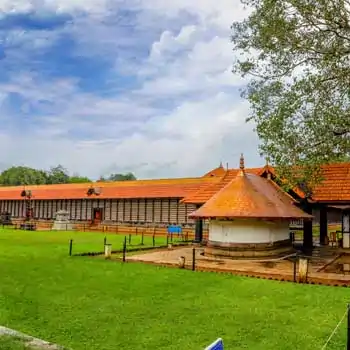Guruvayoor Temple: History, Significance, and Visitor Guide
Mamankam, the significant battle between the Zamorins and the Raja of Valluvanad on the banks of Bharathapuzha in Thirunavaya, stands as a notable event in the historical significance of Guruvayoor Temple. This prolonged conflict led locals to seek the blessings of Guruvayoor Appan, Lord Krishna. Even the Zamorins became devotees of Guruvayoor. Consequently, the temple gained fame among the people due to this war. However, it faced invasions from the Dutch, Hyder Ali, and Tipu Sultan, which resulted in considerable loss of wealth. References to this temple predominantly surface in texts from the 16th century.
Greatness:
The temple tank is known as Rudratheertham among devotees. This name originates because Lord Shiva worshipped Vishnu near this pond, thereby christening the water with his name “Rudra,” which means “Shiva.” According to legend, Pracetas, sons of a mythical king, performed tapas here for 10,000 years seeking blessings from Lord Vishnu to become supreme rulers. Lord Shiva emerged from the pond and asked them to chant Rudragitha for blessings. They succeeded in their quest by receiving Lord Vishnu’s favor.

Janamejaya, grandson of Pandavas, was afflicted with leprosy without hope for a cure. Sage Atreya sought refuge at Guruvayoor to obtain blessings from Lord Shree Krishna. After ten months of abode there, he was cured by Lord Krishna.
Specialty:
From June to September each year, Krishnanattam takes place requiring prior booking. This special puja purges poison effects, supports unmarried women's well-being, eradicates enemies, fulfills vows and eliminates poverty while leading towards soul salvation.
Elephants affiliated with the temple reside and are fed at Punathoor Kotta. Currently housing 56 elephants in total here near Thrissur at Anakotta harbors one of Asia's largest male elephant populations which were mostly tusked males donated by devotees to the temple contributing annual festival revenue estimated at 3.7 crores for 2014-2015.
Festivals:
Janmashtami
Kumbham Utsavam
Ekadashi
Timing:
3 AM to 1:30 PM
3:30 PM to 9:30 PM
Dress Code to Visit the Temple
Traditional attire is preferred when visiting Guruvayoor Temple. Men are required to wear a white Pancha or dhoti (mundu) without an Angavastram while entering the shrine. Women may wear a saree or salwar kameez with a dupatta. Modern clothing such as jeans, shorts, or short skirts is strictly prohibited within the temple premises.
How to reach Guruvayoor Temple? :
By Road: The site is around 29 km away from Kerala.
By Air: Kochi (80km) and Calicut (100km) serve as the nearest international airports.
By Rail: Guruvayoor has a railway station linked via Thrissur on Chennai-Mangalore routes; travelers from Mangalore alight at Kuttippram station.
Best Time to Visit:
August through February represents ideal months for visiting Guruvayoor Temple. Furthermore choosing Ekadashi day offers a remarkable opportunity since celebrations are markedly significant during this period at the temple.”
FAQs:
By Air: The nearest international airports are Kochi (80 km) and Calicut (100 km).
By Rail: Guruvayoor has its own railway station linked via Thrissur, connected on the Chennai-Mangalore route. Travelers from Mangalore can alight at Kuttippram station.